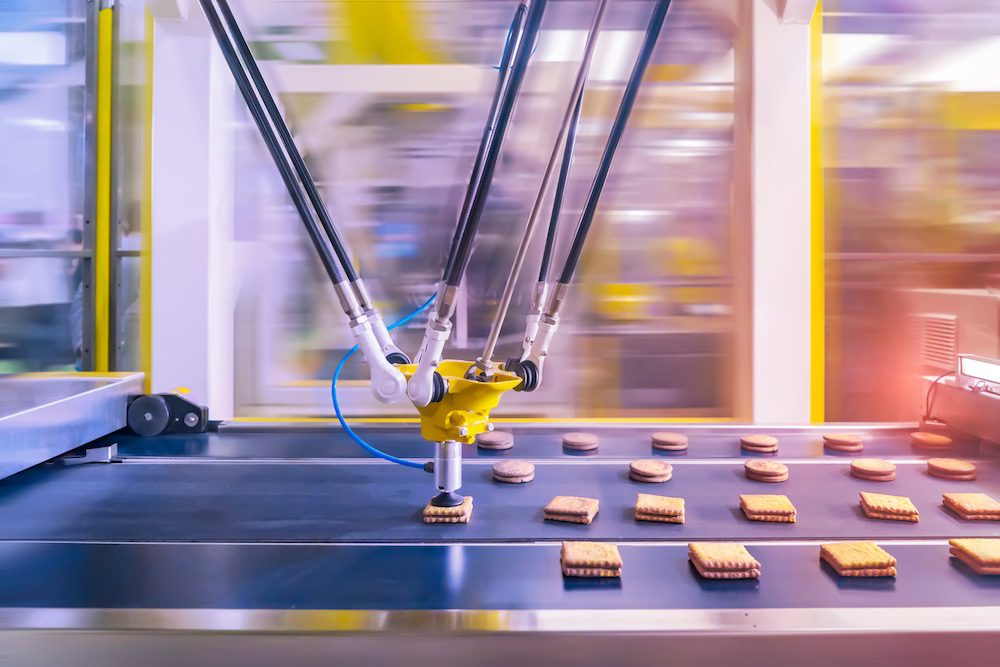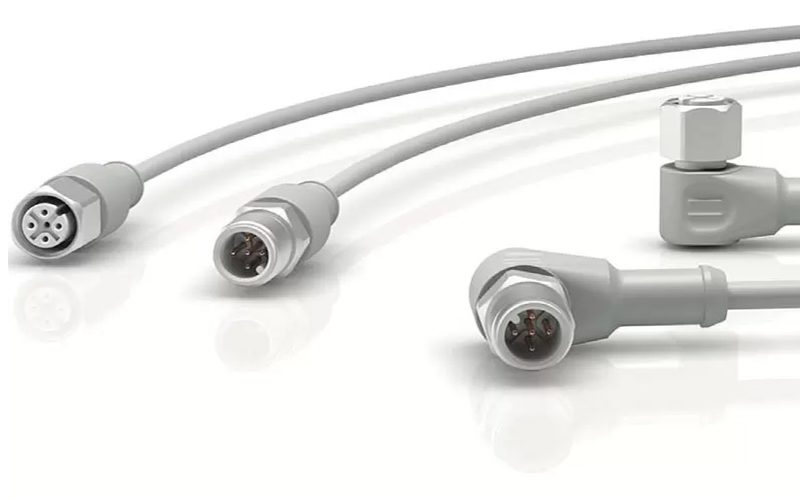Food & Beverage Connecters Require a Flair for Cleanliness
From farm to table, via industrial processing, packaging, and shipping, food requires special considerations to keep it fresh and free from contamination. Interconnects that are designed specifically for the food and beverage industry are an important part of the system that keeps our food safe to eat.

Food safety standards apply at every stage of food production. Food and beverage connectors and cable assemblies, therefore, require durable construction and rugged materials with exceptional resistance to corrosion and contamination. Durability is important because these connectors must withstand harsh cleaning processes without compromising performance. Their design focuses on preventing ingress of moisture or debris, further enhancing food safety. Food-safe interconnects also provide reliable and secure connections, reducing the risk of downtime in food processing operations.
The materials used for food industry connectors and cables are specifically chosen for their antimicrobial properties. Stainless steel, known for its inherent resistance to bacterial colonization, and polymers, like PVC with embedded antimicrobial agents, are ideal for use in food and beverage applications. “These materials work to create a barrier against harmful microorganisms and inhibit bacterial growth. By reducing the risk of contamination, they help ensure food safety,” said Robert Grzib, marketing manager at CDM Electronics.
Incorporating antimicrobial properties into these connectors helps maintain a hygienic processing environment, crucial for compliance with food safety regulations. As these specialty interconnects help prevent microbial-induced deterioration, antimicrobial connectors contribute to extending the lifespan of processing equipment. Their ability to inhibit the growth of bacteria and fungi on connector surfaces enhances cleanliness and reduces the potential for spreading foodborne illnesses. The use of antimicrobial connectors promotes a safer and more sanitary working environment, ultimately ensuring the quality and integrity of the food products as well as providing processors with the confidence that the technology they use actively combats harmful pathogens.
Hygiene zones
In food production, three hygiene zones are identified to determine what level of hygiene standards are required for equipment.
1) The hygienic design zone includes areas where equipment is in direct contact with food, such as conveyor belts, nozzles, and cooking surfaces. This area has the highest potential risk of contamination from pathogens on equipment, including connectors and cables, which are often needed in this zone for sensing applications.
2) The spray zone (or splash zone) includes locations immediately around the food production area. Drops of food or runoff from equipment can result in contamination of the food product.
3) The non-product zone is any area in the factory that is not in direct contact with the food being processed. Even in these areas, however, extensive cleaning is often required and can result in chemical and mechanical stress on equipment.

binder offers a wide range of interconnects, including Ecolab-and FDA-compliant M12-A connectors (Series 763), 7/8” connectors, and M8 and M12 stainless-steel connectors for use in the spray zone and non-product zone.
M12 connectors provide durability and reliability
Along with the safety issues that are paramount in the food and beverage industry, connectors must address reliability. M-format signal and power interconnects provide numerous benefits for food and beverage processing equipment usage. M-series interconnects are known for durability, vital for reliable connections in harsh environments. They reduce the risk of signal loss or interference for secure and stable connections, The M12 format’s compact size enables efficient use in confined spaces that are common in automated environments. Its quick and easy installation saves valuable time during equipment setup. The M12’s versatility allows for compatibility with a wide range of OEM equipment, enhancing flexibility in system design. Many M12 connectors adhere to food and beverage processing equipment industry standards, ensuring easy and universal integration.
One of the ways companies that are in or serve the food and beverage industry ensure food safety and maintain clean environments is through partnering with Ecolab for science-backed certification and solutions. “This includes testing the resistance of industrial products, such as cables or connectors, to Ecolab cleaning agents widely used in the food and beverage industry. The Ecolab test method entails a complete immersion in the cleaning agent for 28 days at room temperature,” said Philipp Zuber, product manager at binder. binder’s Ecolab-certified products include stainless-steel connectors with IP68/IP69 protection and PVC cables able to tolerate washdowns with water and aggressive cleaning chemicals.
Like many industries today, “the food and beverage industry is experiencing an increasing demand for monitoring and data collection within the production process. This results in a larger need for sensors, which, in turn, leads to more data volumes and the demand for the networking of systems in the sense of a ‘smart digital factory,’” Zuber said. “Food production and supply is one of the most important industries for humans, as we need it to survive regardless of external circumstances. This makes it very attractive for businesses to be part of.”
To learn more about the companies mentioned in this article, visit the Preferred Supplier pages for CDM Electronics Inc. and binder.
Like this article? Check out our other Ethernet and Industry 4.0 articles, our Industrial Market Page, and our 2023 and 2024 Article Archives.
Subscribe to our weekly e-newsletters, follow us on LinkedIn, Twitter, and Facebook, and check out our eBook archives for more applicable, expert-informed connectivity content.
- Sealing Success: Overmolding for More Secure Connections - April 23, 2024
- Medical Cable Assemblies Product Roundup - April 23, 2024
- Mezzanine Connectors Product Roundup - April 16, 2024





